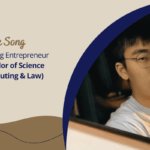By the SMU Digital Marketing Team
For those of us living in the developed world, technology has touched almost every chord of our daily lives. Coupled with the rise of a new normal as we overcome the tide of the pandemic and its effects on the workforce, digitalisation is no longer a future possibility, but a current reality.
It’s therefore timely that the Bachelor of Science in Computing and Law programme was launched by SMU’s School of Computing and Information Systems (SCIS) in 2020. It is a perfect fit in this historical era, where digital innovation in key sectors—including law—has become essential for continued growth.
The demand for digital innovation in legal services comes as no surprise, especially when the shift towards tech-driven services and AI (artificial intelligence) functions in any consumer-facing business is becoming as basic an offering as Bot-powered live chat client solutions.
We speak with two current students of the programme, who share their insiders’ perspectives on the course curriculum as well as the challenges of the dual study of Law and Computing—a combination many may assume to be vastly disparate subject spheres.
Straddling modules across different subjects broadens capabilities
One of the unique features of the course that both students found compelling was its dual specialisation. This enabled them to both challenge themselves academically and cultivate new competencies that they initially did not think they were capable of. On one hand, the study of Law requires high ability in language and communication, while many assume Computing to require mainly numerical skills.

Jonathan Lim, SMU Year One Computing and Law student
“Both of the tracks in our course have a steep learning curve,” confessed Tong My Linh, a first year Computing and Law student. “With each new module, I have to double my efforts to learn and reinforce my knowledge on the topics taught, ‘switching’ my brain between technical and language skills.”
Her fellow coursemate, Jonathan Lim, agrees. “Before joining the programme, I felt like I was someone who did not have a particular inclination towards either Law or Computing, as my tertiary education was very Math- and Science-centred,” he explained. “After joining the course, I definitely feel that I lean towards the side of computing, as the logic seems to come easier for me.”
He further explains that because the methodologies required for mastering both subjects are different, he has developed new skill sets. “Computing requires drill and practice while legal knowledge is acquired mostly from reading and understanding,” he reflects. “The former is something most of us are used to from sitting the national exams. So the rigour of having to read critically (for the Law modules) is a new experience for me”.
Acquiring skill sets that enable future-readiness
Furthermore, both students felt that the course is preparing them to offer better solutions to problems that may arise in the post-pandemic world.

Tong My Linh, SMU Year One Computing and Law student
While she was initially intimidated by the 20-page admissions requirement, My Linh did not let that stand in the way of her interest in pursuing the course, even though the two areas of study proved to be equally challenging for someone coming from a Banking and Finance background.
“It was tough for me to switch between Information Systems and Law modules,” she admitted. “It was all about writing codes and mathematics applications in one lesson, and then having to recall case laws and statutory interpretation in another.”
But having learnt the soft and hard skills from both Law and Computing, My Linh believes she is gaining insights from each and seeing a bigger, interconnected picture. “For example, while writing codes in Python, I notice that they are actually logical arguments—just as in the study of Law,” she observes. “I believe what students get to learn from both would be of great benefit to our future, whether we choose to take on Law or Computing later on.”
For Jonathan, critical thinking was the key skill that the two areas of study had in common. Putting that ability to practice would not just ensure success in the degree programme, but also serve as an important quality for someone wishing to pursue work in either areas.
“Being able to think critically comes in handy for success in both areas of study,” he declares. “Coding (for Computing) may present a hurdle for those not given to a systematic and logical style of thinking. But with enough practice, I believe anyone can master it. While Law modules entail long hours reading cases and legislature.
Ultimately, Law and Computing are both about problem-solving; identifying the key issues and then applying your knowledge critically to find a solution.”
An open mind will get you far
One of the key takeaways mentioned was the importance of being open to things that may be beyond their comfort zone. This was not least because both students experienced some disruption during their course of study.
My Linh recalls a coding class in her first semester that was conducted in a hybrid “onsite and online” mode and peer interactions were initially awkward, given the social distancing measures. But she acknowledges that it was a necessary situation that ended up contributing positively to the overall experience.
“Be it online or offline, I focused on being willing to learn and take on hard concepts being taught in Information Systems,” she shares. “On the other hand, Law modules helped me to cultivate skills in persuasive reasoning, structuring and planning.”
Shifting his own preconceived notions also helped Jonathan to enjoy and make the most out of his first year in the degree programme.
“Matriculating in 2020, in the midst of Covid-19 was certainly not something I expected to go well. A lot of emphases were placed on ensuring social distancing in the form of online lessons, and strict guidelines when studying on campus,” he shares. “Despite that, the school did try to make the matriculation experience as unchanged as possible, with the continuance of major events like Freshmen Orientation and Vivace (a CCA Fair) conducted online.”
He also recounted his surprise and delight while taking a module called Singapore’s Legal Systems and Legal Analysis Skills. “My lecturer was an adjunct faculty who is a practising lawyer by day. His enthusiasm in sharing with us his interest in Law was really quite inspiring and at times it was hard to tell that he was not a full-time Professor,” he enthused. “He did a great job in engaging the class; especially this Freshman student learning about Law for the first time.”
Ready to embark on your SMU experience? Accept your offer today!










